GE2025 Hot Spots: Sengkang GRC set for fierce contest, as PAP seeks to wrest it back from WP
After a surprise election result in 2020, the Workers’ Party and People’s Action Party are both doing their best to endear themselves to Sengkang’s electorate, where residents' concerns range from national issues such as the cost of living to the range of halal food options available in their neighbourhoods.
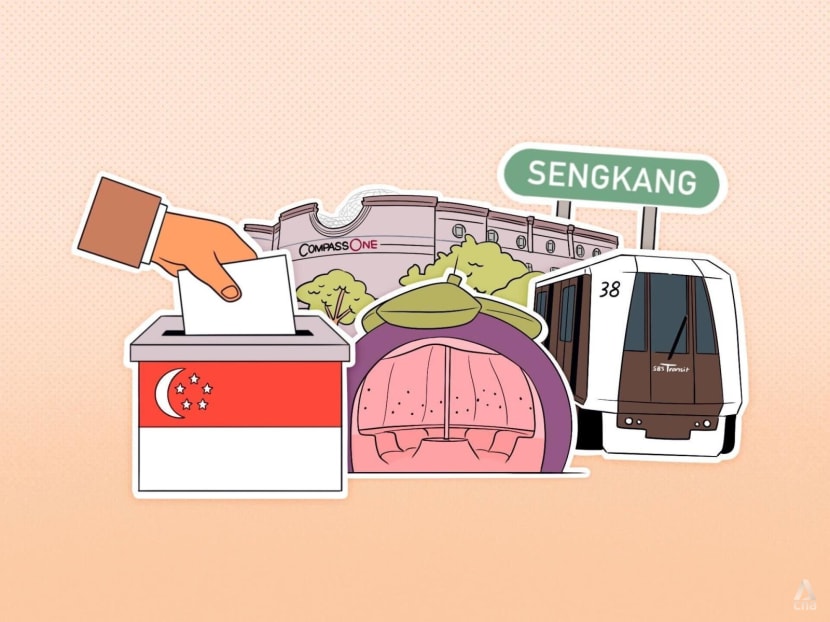
The Sengkang Group Representation Constituency is one to watch for the coming General Election. It has close to 125,000 eligible voters as of July 2024. (CNA/Nurjannah Suhaimi)

This audio is generated by an AI tool.
Singapore is set to hold its next General Election in 2025 and political parties have ramped up their preparations, pounding the streets and pressing the flesh as they gear up for the hustings. In this series, CNA TODAY zooms in on four group representation constituencies (GRCs) – Sengkang, East Coast, West Coast and Marine Parade – where fierce fights are expected to take place. In this first instalment, we look at Sengkang GRC, the youngest GRC that was formed just in the last election but produced an unexpected result.
The starting pistol for this year’s General Election has yet to be fired, but members of the Workers’ Party (WP) and the ruling People’s Action Party (PAP) are already off the blocks in the race to win voters’ hearts in Sengkang Group Representation Constituency (GRC).
Even if the names of the party members who are in blue polo tees (WP) and white shirts (PAP) might not be familiar to the people, their faces certainly are.
Political hopefuls on both sides have been spotted actively walking the ground, giving out goodie bags and ice cream and routinely posting photos and messages of their efforts on social media.
Of the more than 50 residents in Sengkang interviewed by CNA TODAY, about half said that they had either seen or interacted with a WP or PAP member in the estate recently.
Community spaces all around Sengkang have been a subtle but key battleground for both parties ever since the conclusion of the 2020 General Election, which took the nation by surprise.
WP’s slate of candidates comprising lawyer He Ting Ru, equity research analyst Louis Chua, social activist Raeesah Khan and associate professor of economics Jamus Lim came out on top with 52.13 per cent of votes.
They defeated the PAP team, which consisted of labour chief Ng Chee Meng, then minister in the Prime Minister’s Office, political office holders Lam Pin Min and Amrin Amin, as well as lawyer Raymond Lye.
For the better part of four years, Sengkang residents have had the chance to attend the many community events organised by WP where they could meet their elected Members of Parliament (MPs).
This includes the “River Run” initiative where residents may gather at the Sengkang Sports Centre in Anchorvale on the first Saturday of every month to run alongside their MPs.
Ms Radhika Radhakrishnan, a 45-year-old consultant who has lived in Sengkang for seven years, said that she has attended these runs several times since they began in 2022, where she had the opportunity to converse with Assoc Prof Lim in a casual setting.
“People usually meet their MPs for ‘something’, so I like that we can just meet our MPs for no particular reason,” she added.
Constituents have also attended various events organised by the residents’ networks under the People’s Association, where the guests-of-honour are often the PAP’s Sengkang branch chairs.
Dr Lam from PAP, who serves as the adviser to Sengkang’s grassroots organisations, is still an ever-present figure at student bursary award ceremonies and other community events in the constituency, parents said.
The active involvement of both these political parties means that Sengkang residents are often spoilt for choice when it comes to community activities.
Case in point: The constituency had at least four separate Christmas parties at the tail end of 2024, with two of them falling on the same date and time, graced by members of the different parties.
With WP keen to strengthen its hold on Sengkang and PAP intent on wrestling it back, CNA TODAY dives into the key talking points surrounding Singapore’s youngest GRC ahead of this year’s election. The election must be held by November, though political observers said that it may happen as early as April or May.
What does the electorate want, who might be the potential candidates and what may tip the scales for a party to win the constituency?
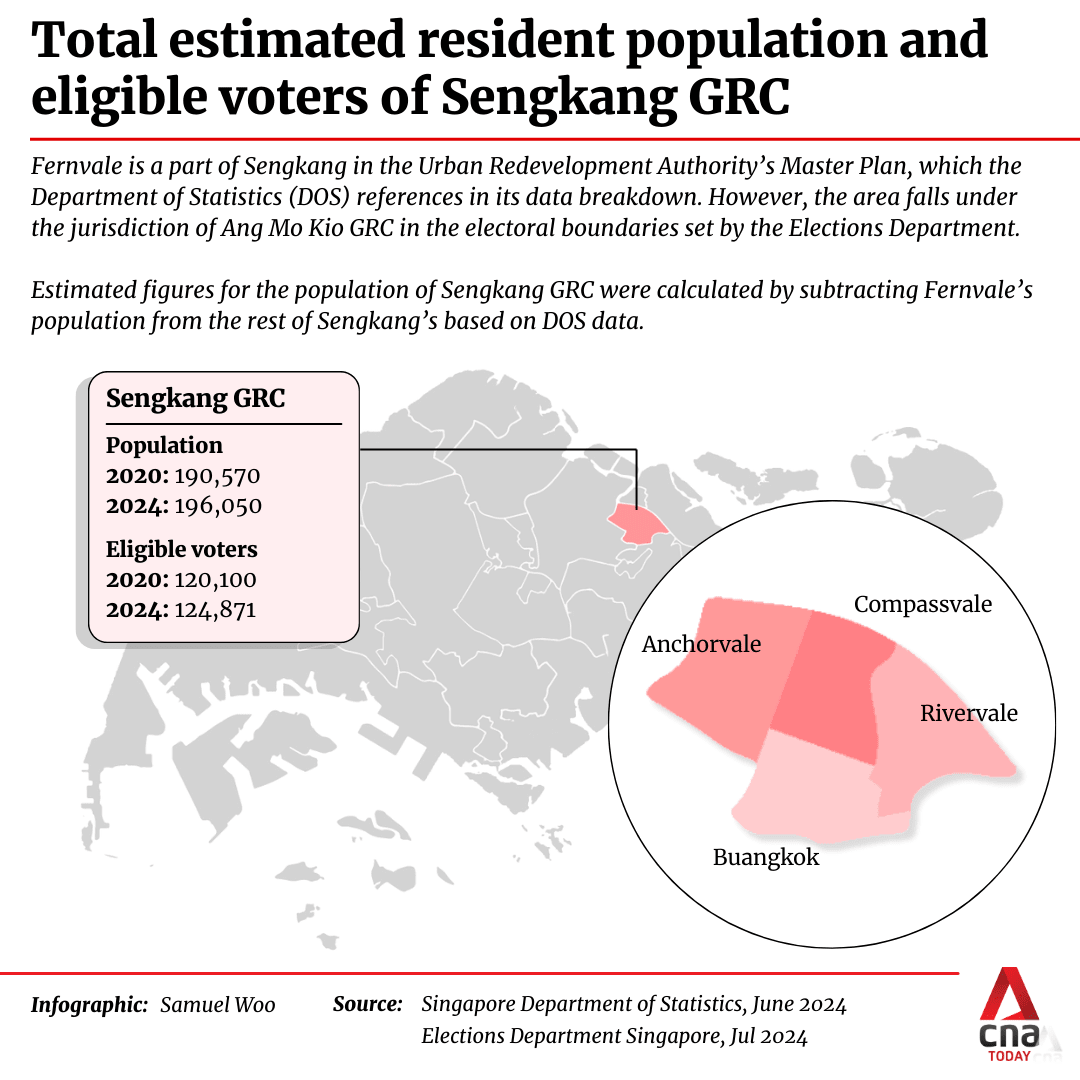
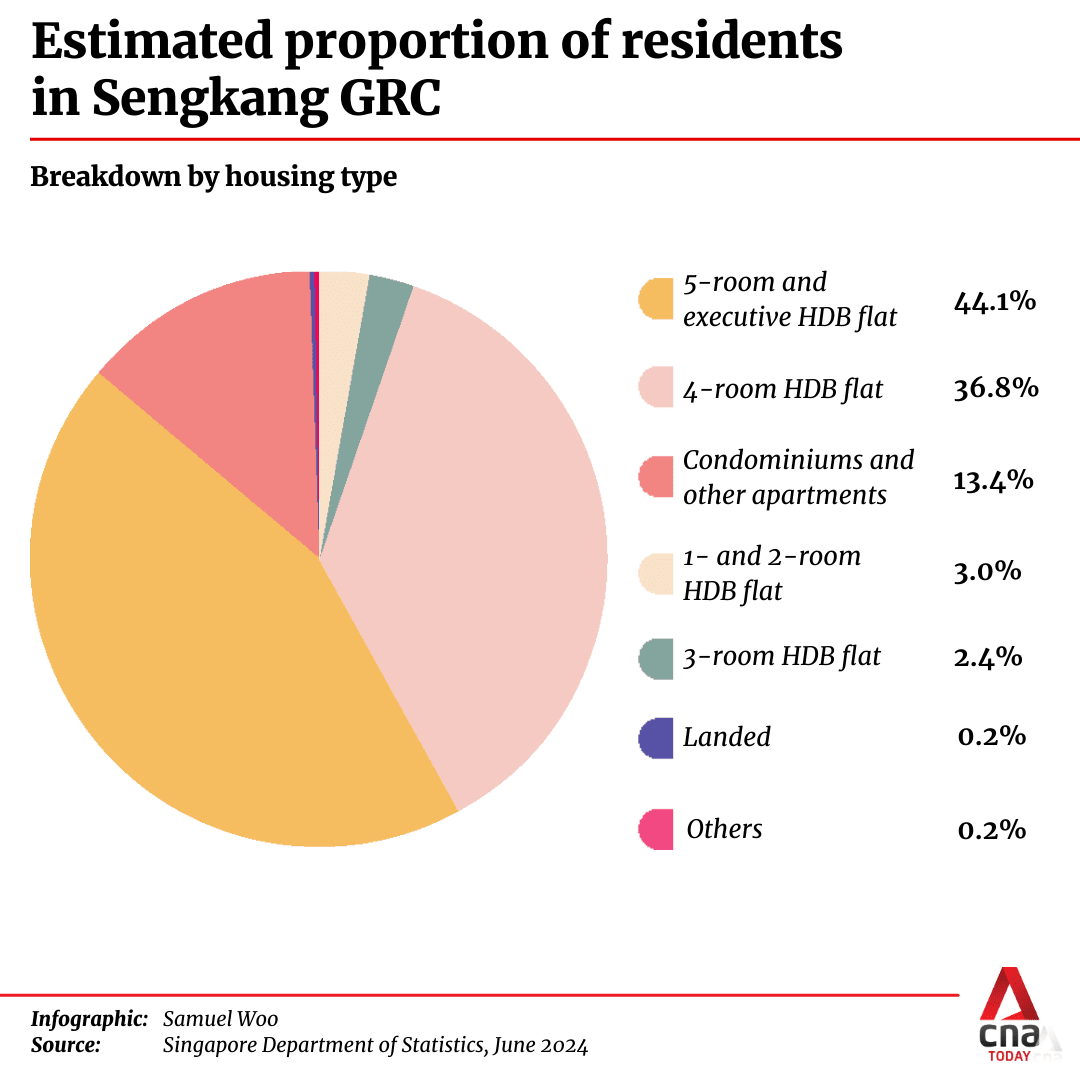
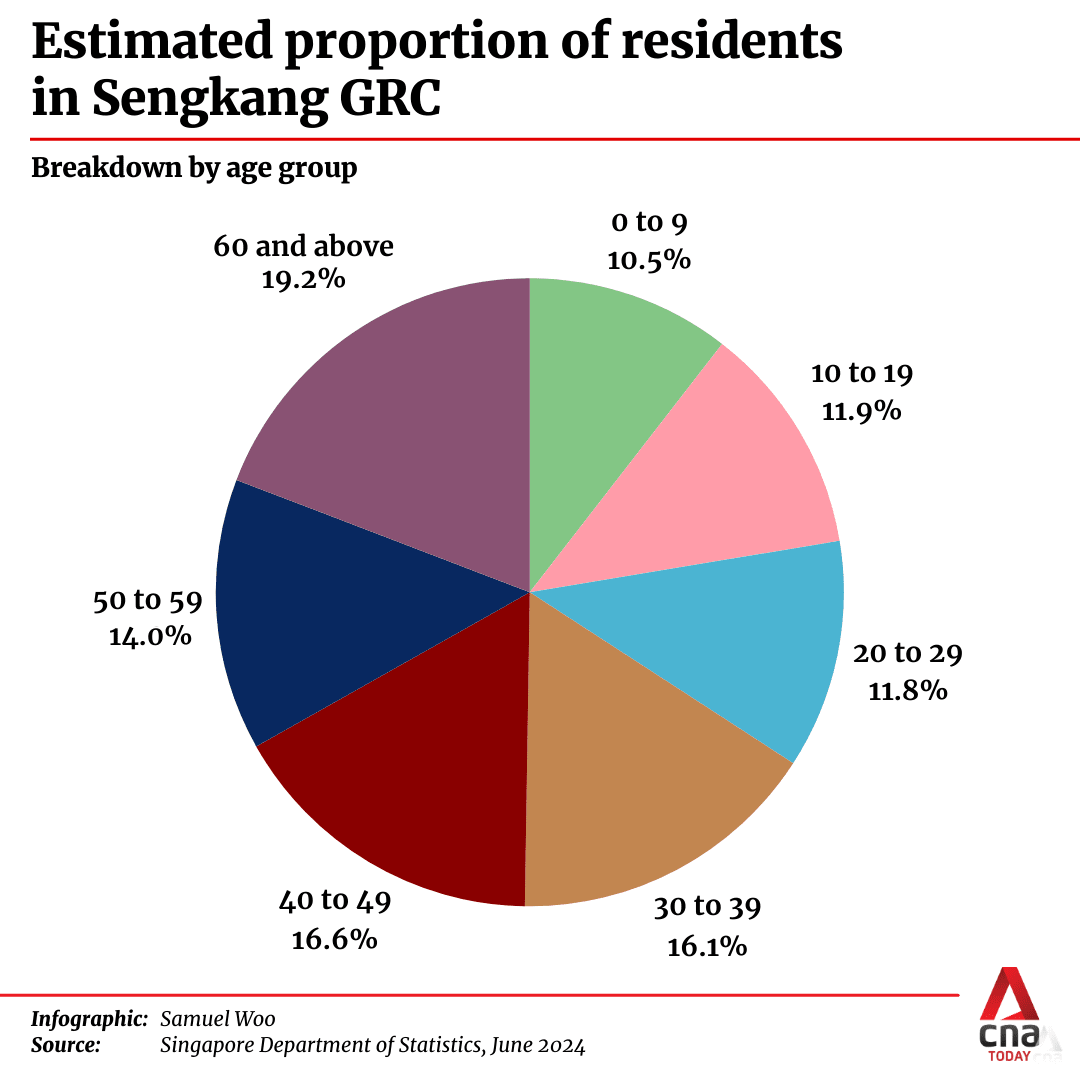
THE SENGKANG ELECTORATE
As a relatively new town, one defining characteristic of the Sengkang electorate is that people there are younger than the national average: More than 50 per cent of residents there are under the age of 40 and just 19.2 per cent are aged 60 and above.
The GRC comprises four divisions: Anchorvale, Compassvale, Rivervale and Buangkok.
Fernvale is officially a part of Sengkang in the master plan of the Urban Redevelopment Authority, but it falls under the jurisdiction of Ang Mo Kio GRC.
Data from the Singapore Department of Statistics indicate that about 196,000 residents lived in Sengkang as of June 2024, excluding residents living in Fernvale.
More than 86 per cent of Sengkang’s residents lived in public housing or Housing and Development Board flats.
The latest data regarding ethnic make-up in the constituency as of June 2020 showed that 77.5 per cent of its residents were Chinese, 10.7 per cent were Malay, 9.3 per cent were Indian and 2.5 per cent were of other ethnicities.
In 2020, the total number of electors for Sengkang GRC was 120,100, but this number will likely increase for the 2025 General Election.
The latest revised voter rolls certified by the Elections Department Singapore showed that Sengkang GRC had 124,871 electors as of July 21, 2024.
WHAT SENGKANG RESIDENTS WANT
1. NATIONAL CONCERNS
In conversations with members of the Sengkang electorate last month, CNA TODAY heard from residents about several issues close to their hearts as the country edges closer to the General Election.
Top of these are national issues: The cost of living, followed by jobs and unemployment, and then housing.
Sengkang resident Yang Zhi Hao, a 45-year-old account manager, said that there should be more financial assistance for seniors, the unemployed and the handicapped as costs for necessities here continue to rise.
“On the surface, everyone looks like they can survive, but many are struggling to make ends meet,” he said.
Mr Benjamin Tan, a 37-year-old management consultant living in Anchorvale, agreed: “I remember a few years ago, I could buy plenty of (groceries and necessities) with just S$100 a week. Now it exceeds that when the (shopping) cart isn’t even full.”
Anxieties surrounding the job market also surfaced. Lifelong Sengkang resident John Lee, a 22-year-old full-time national serviceman, said that he was “a bit worried” if his polytechnic diploma would be enough for him to find a full-time job in the future.
This comes as the full-time permanent employment rate fell and the unemployment rate of polytechnic graduates rose as compared with 2023, based on findings from a 2024 graduate employment survey conducted by the five polytechnics in Singapore.
Such views are largely consistent with a survey published earlier last month by market research firm Blackbox Research, which examined Singapore voters’ top concerns before the upcoming polls.
2. ESTATE CLEANLINESS
As for matters at the constituency level, it was a mixed bag.
The majority of the residents who were interviewed said that they were content with the amenities, partly due to several fresh developments in recent years.
Anchorvale residents, for instance, particularly appreciated the variety of food and beverage options that came with the launch of the Anchorvale Village Hawker Centre in June last year.
Past gripes about how often housing blocks in Anchorvale were cleaned seem to have dissipated after the Sengkang Town Council (SKTC) took over the direct management of Anchorvale in November 2021.
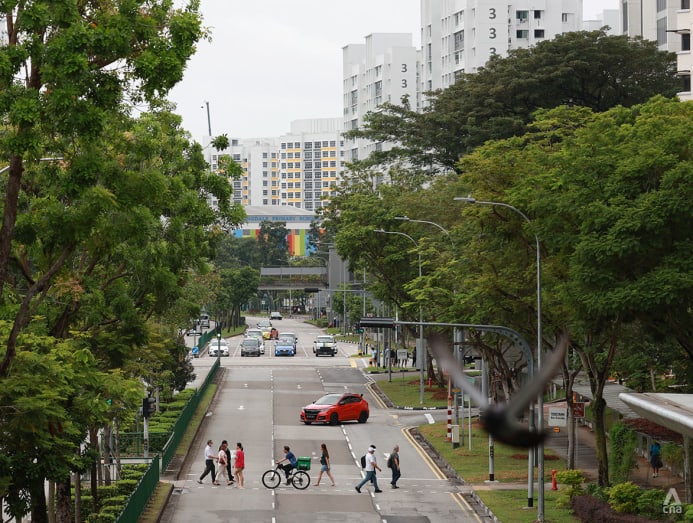
For those living in Buangkok, there was positive feedback on the opening of the Sengkang Grand Mall in March 2023.
In general, most residents found the Sengkang estates' cleanliness to be satisfactory.
Mr Samsudin Parik, a 64-year-old public servant who has lived in Rivervale for more than 20 years, said that there was “not much” to complain about in terms of estate upkeep.
However, there were others who felt that there was room to improve.
Mr Yang, the account manager who lives in a flat along Rivervale Street, said that his estate sometimes looks “old and dirty”.
The clearing of garbage could be more frequent and he has noticed more mosquitoes entering his flat, he added.
Rivervale is home to the first apartment blocks that were built in Sengkang in the late 1990s.
As some public housing blocks there are several decades older than new developments elsewhere in Sengkang, other Rivervale residents brought up the matter of estate maintenance.
Ms Tan Wei Wei, a 56-year-old cleaning specialist who moved from a three-room flat in Tampines to Rivervale last year to be closer to her family, was worried about an incident where she said her mother had seen a brick fall off of a nearby housing block last November.
When CNA TODAY approached WP about these concerns, the party referred us to the town council. SKTC then said that it was unable to locate the feedback in its database and advised the residents to reach out to it directly for assistance.
The town council also said that its officers closely monitor the cleanliness standards of its estates and hold contractors accountable should they fall short.
"Interventions such as monitoring and replacing ground staff have led to noticeable improvements, as shared by residents. We will continue to keep a close watch on the situation," it added.
3. HALAL FOOD OPTIONS
Upkeep aside, some residents mentioned that there was a lack of halal food choices where they lived.
Increasing the number of coffee shops, for instance, was among one of the proposals that WP announced during the election constituency broadcast back in 2020, though it did not specify how many of these eateries would be halal-certified, if any.
Ms Norisnah Mohd Ishaq, a 34-year-old homemaker who has lived in Compassvale for three years, said that before the opening of the Hjh Maimunah stall in Compass One mall just last October, it was difficult to find halal food.
Other residents such as financial consultant Khamal Ahmad agreed, noting that there were just two halal food stalls within a short walk from his home in Compassvale Crescent.
More choices can be found a 10-minute walk away at places such as the Sengkang General Hospital or the Compass One mall, but even then, those were mainly fast food, the 38-year-old said.
Compared with neighbourhoods such as Tampines or Yishun where he has lived before, Sengkang "cannot fight" in terms of halal food options, he added.
SKTC told CNA TODAY that it acknowledged residents' feedback regarding matters of food options and the cost of living even though these fall outside of the scope of the town council.
It also said that the Housing and Development Board (HDB) recently awarded a tender to have halal-certified "vending machine cafes" installed at both Block 108 Rivervale Walk and Block 288B Compassvale Crescent, following MP Louis Chua's feedback regarding such concerns to the agency in April 2023.
WILL RAEESAH KHAN FACTOR PLAY A PART?
A major political development involving the incumbent team at Sengkang GRC was the sudden exit of WP MP Raeesah Khan in 2021.
Ms Khan, who helmed the Compassvale division, resigned as a party member and MP about a month after admitting to lying in Parliament.
The issue was not a top-of-mind concern for most Sengkang residents who spoke to CNA TODAY, though a handful of them expressed their disappointment over the episode.
Mr Nantha Kumar, 44, a Sengkang Crescent resident of 13 years, felt that WP had made a "judgment mistake” in fielding her as a candidate.
“I don’t know how they did their assessment, how they recruited people,” the information technology professional said.
Others felt that the matter had little bearing on their day-to-day lives and was thus not a major concern to them even if it did not look good on WP, and they were indifferent to it.
Mr Alan Yeh, 57, who is currently unemployed and has lived in Sengkang East for about 20 years, said on whether the episode had altered his perception of WP: “I think it’s a storm in a teacup.”
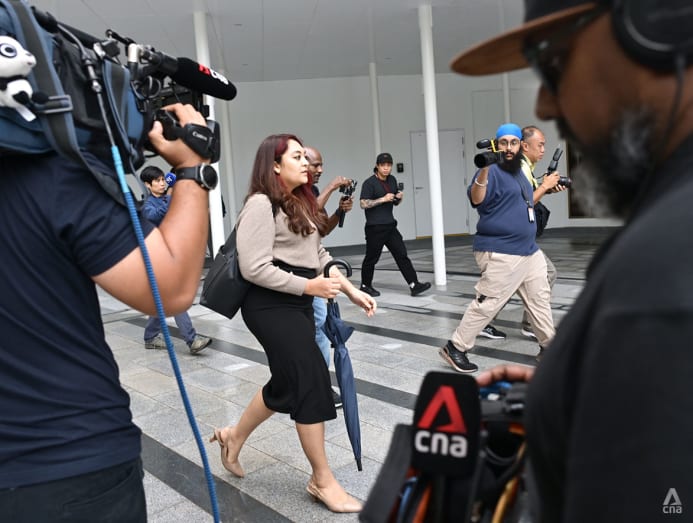
WP's chief Pritam Singh revealed last month at the party’s annual members’ forum that the party has engaged commercial parties to “assist in candidate screening and personality review”, in a move described by those in the business of doing background screening as a rarity among political parties here.
It was not explained why WP went with this approach.
In an abridged transcript of his speech made available online to the public, Mr Singh said: "Of course, none of these measures are foolproof, nor can they guarantee that all previous infractions of an individual will come to light ... It is important that I set this expectation, but the party will do our best.”
During the 2020 General Election hustings, the police probed two social media posts that Ms Khan had published in the past before becoming a candidate, for allegedly promoting enmity between different racial or religious groups.
Mr Singh said at the time that he had been unaware of the posts.
Political experts who spoke to CNA TODAY were unanimous in saying it was “not surprising” that Sengkang residents were largely not bothered by Ms Khan’s resignation and its fallout for WP.
Associate Professor Eugene Tan, law lecturer from the Singapore Management University (SMU) and former Nominated MP, said: “(Residents) see it more as a personal failing (on Ms Khan’s part), notwithstanding that the party did not handle the matter as well as it should, which resulted in the criminal charges under the Parliament (Privileges, Immunities and Powers) Act against party leader Pritam Singh.
“To be clear, the whole saga has had a negative impact on WP but I don’t see the matter undermining the WP Sengkang team members, who are not implicated, as much as it would of Pritam Singh.”
Ms Khan’s false anecdote in parliament about her witnessing the police allegedly treating a sexual assault victim insensitively set in motion an investigation by a Committee of Privileges, which looks into any complaint alleging breaches of parliamentary privilege.
Mr Singh, who is also the Leader of Opposition, later faced two charges of lying to the committee. He has claimed trial to the charges and the verdict for the case has been fixed for Feb 17.
Commenting on how Sengkang residents have responded not so negatively to this saga, independent political observer Felix Tan said that this reflected the work put in by the remaining three MPs on the team, filling the void that Ms Khan had left.
“They have managed to continue to build rapport with the residents and take over Raeesah Khan’s position in that division. I think it clearly shows that they have dealt with the crisis quite well (at the Sengkang level).”
The impact on WP’s credibility as a party may be “another question altogether”, he added.
Dr Tan also said that since Ms Khan had a short-lived tenure of fewer than two years, the constituents may not have felt her absence as much as, say, if a multi-term MP whom residents “have come to embrace as part of the constituency and family” were to resign.
Political analysts said that moving ahead, prospective PAP candidates should avoid dwelling on this saga and if it comes up, WP's team should not be defensive about it either.
Mr Aaron Tan, a 33-year-old Compassvale resident who works in advertising, said: “I’ll be considering (to vote) just those who are there to contest. So, to me, her issue is water under the bridge.”
NEW FACES ON BOTH SIDES
With a vacant seat in the GRC, constituents will likely see at least one new face contesting with the WP team at the upcoming election.
So far, the party has let on very little about its plans.
Mr Singh said at the members’ forum this year that it serves the party “little purpose” from a political standpoint to reveal its candidates before Nomination Day, “unless there is a strategic or tactical reason to do so”.
The most prominent new face and possible candidate on WP’s side in recent times is Senior Counsel Harpreet Singh, but he has been walking the ground in Marine Parade.
In the meantime, Mr Abdul Muhaimin Abdul Malik has been regularly spotted with the Sengkang MPs recently, appearing in photos with them during door-to-door house visits or at community events almost every month since last September.
His professional profile on LinkedIn shows that he is a senior property manager at Aljunied-Hougang Town Council, where he has worked since 2015.
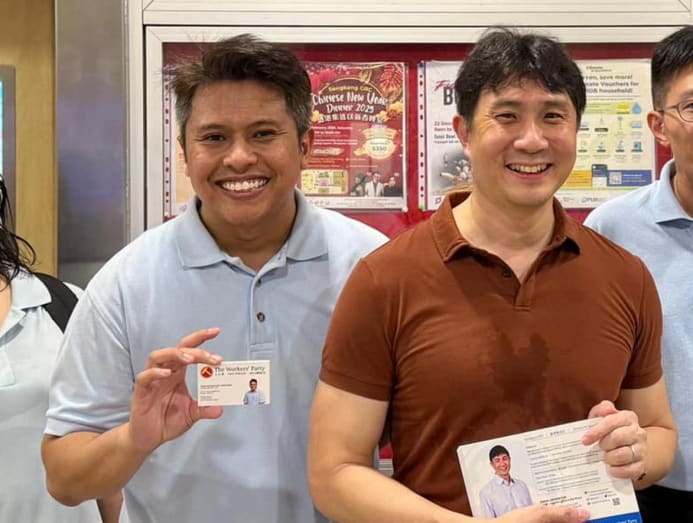
Dr Mustafa Izzuddin, a senior international affairs analyst with consultancy Solaris Strategies Singapore, said that “it would not be in their interest” for WP to disrupt the Sengkang team and replace them with new faces.
Fielding the sitting MPs who have been serving the constituents there over the last five years or so can help the party maximise its “incumbency advantage”.
“If an individual who has been elected doesn’t want to stand for elections anymore, that’s a different issue. But if the party is making the decision of where to field those candidates, then they should stick to where they are at the moment.”
In the meantime, some Sengkang residents are hoping to see some known names from the PAP side, recalling that the ruling party had fielded three political office holders in 2020 headed by Mr Ng the labour chief.
One Anchorvale resident, who declined to be named, said that he had met Dr Lam when the PAP member was making his rounds in the neighbourhood.
“I told him it was disappointing that those who lost the election with him (in 2020) did not come back for a fight. I think it’s sending the wrong message,” the 52-year-old bio-entrepreneur added.
Of the three political office holders fielded by PAP at Sengkang in 2020, only Dr Lam – a former senior minister of state – remains as the party’s branch chair in Sengkang West.
In 2022, PAP introduced new faces to helm the other divisions: Associate Professor Elmie Nekmat (Sengkang Central), Ms Theodora Lai Xi Yi (Sengkang North) and Mr Ling Weihong (Sengkang East).
They took over from Mr Ng, Mr Amrin and Mr Lye respectively. However, the Sengkang East post has been reshuffled twice since then.
Mr Ling was succeeded by communications practitioner Marcus Loh in November 2023. Just last month, Mr Loh was replaced by Mrs Bernadette Giam.
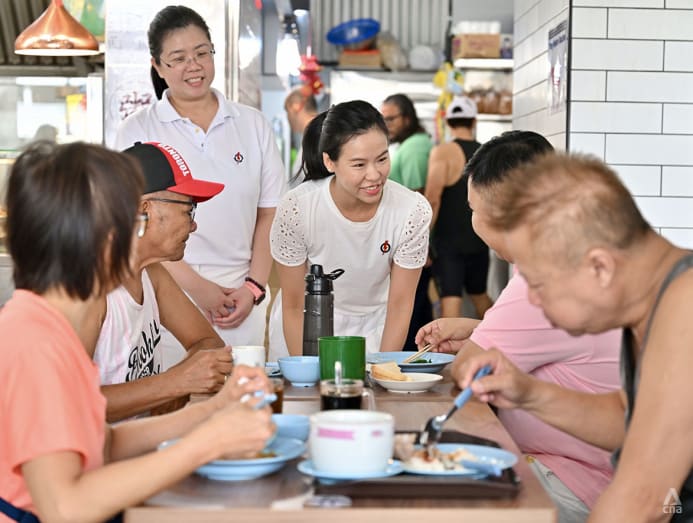
Mr Ng, who is secretary-general of the National Trades Union Congress, said in an interview with The Straits Times last month that he was not ruling out a political comeback and that he was prepared to do so “if asked” by the party.
Last April, he was spotted at a community event in Bukit Batok, but told the media that he was there as part of the labour movement's regular ground engagement.
After the 2020 General Election, Mr Amrin, who was previously a Sembawang GRC MP and whose last political office position was senior parliamentary secretary, posted quite frequently on social media about meeting up with residents of Marsiling, Woodlands and Sengkang as well as being involved in voluntary work across the island.
In January 2021, he announced that he was volunteering as an appeal letter-writer at the Meet-the-People sessions in Chong Pang, under Nee Soon GRC.
Mr Amrin is now head of corporate development at Temasek Foundation, the philanthropic arm of Singapore's state-owned investment firm Temasek. In 2023, he was appointed to the board of directors for the Singapore Tourism Board, where he still serves.
He declined to comment when CNA TODAY asked if he is still actively engaging the ground – and if so, in what capacity – and whether he would stand for election or be open to do so if asked by the party.
For the upcoming election, political analysts all but ruled out a line-up of such similar stature from PAP.
“It is unlikely that PAP will field even one sitting political office holder in Sengkang,” Assoc Prof Tan from SMU said, noting that this is a "conundrum" the ruling party faces when contesting a ward as a non-incumbent.
"Not fielding a hefty slate could be read by voters as the ruling party being not so keen to win the constituency back at all costs. On the other hand, fielding a hefty slate is no guarantee of victory and losing a few political office holders is a consequence that PAP will want to avoid where possible," he added.
Dr Mustafa said it is likely that PAP's plans for Sengkang would follow what it did for Aljunied GRC, a constituency that it lost to WP in 2011.
“In other words, I don't think there's going to be a minister anchoring it.”
Back in 2011, a WP team in Aljunied GRC ousted a heavyweight PAP team that included Mr George Yeo, then foreign affairs minister.
At the next election in 2015, PAP’s team was helmed by a veteran backbencher, Mr Yeo Guat Kwang, who was joined by four new candidates.
Dr Mustafa said that for opposition-held wards, PAP’s strategy now appears to be focused on the grassroots, getting potential candidates to build a rapport with residents over time before eventually fielding them.
SENGKANG'S ELECTORAL BOUNDARIES
On Jan 22, the Elections Department Singapore announced that the Electoral Boundaries Review Committee (EBRC) – in charge of reviewing and making changes to Singapore’s electoral map – had been formed.
In the past four elections, the time between the EBRC's formation and Polling Day ranged anywhere from four to 11 months.
The EBRC marked out the new Sengkang GRC in 2020 by merging what used to be Punggol East Single Member Constituency (SMC) and parts of what used to be Sengkang West SMC and Pasir-Ris Punggol GRC.
Political observers said it is unlikely that Sengkang's boundaries will be drastically changed, given that it just became a GRC one election ago.
There have been examples of constituencies that came and went within an election cycle, but these are rare: Fengshan SMC was carved out of the PAP-held East Coast GRC in 2015 and merged back into the same GRC in 2020.
Moulmein–Kallang GRC is another example: It was formed during the 2011 election and dissolved in 2015.
The analysts also noted that opposition-held wards tend to be left largely untouched by the EBRC and any changes will likely not be significant.
For instance, Potong Pasir SMC remained “largely the same” between 1984 and 2011 when veteran opposition figure Chiam See Tong was the incumbent MP, Assoc Prof Tan said.
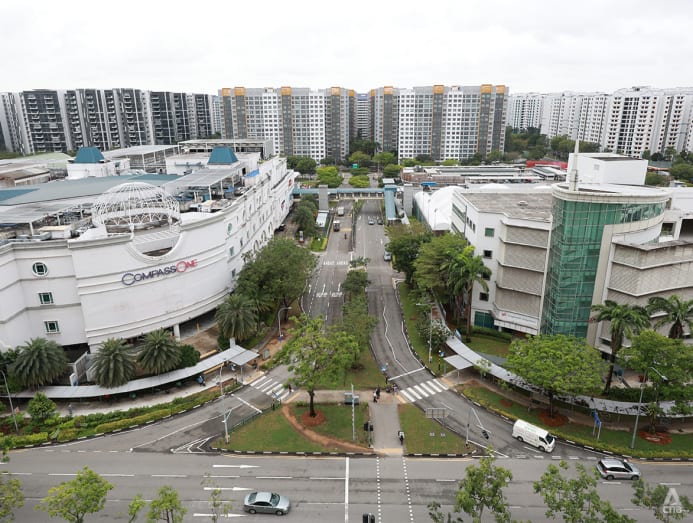
Dr Tan the independent political observer said that splitting up a constituency held by an opposition party can fuel unwanted perceptions of the EBRC favouring the ruling party and cause an unnecessary “ripple effect” on voters’ choices.
In August last year, Ms Hazel Poa, Progress Singapore Party’s Non-Constituency MP, raised a motion in parliament to reform the electoral boundary review process.
During the parliamentary debate, Mr Singh the WP chief had asked Mr Chan Chun Sing, Minister-in-Charge of the Public Service, if there was gerrymandering in Singapore.
Mr Chan roundly rejected the accusations and reiterated that the EBRC works in the interest of voters and not political parties.
PRIORITIES AT THE BALLOT
Ultimately, Sengkang’s constituents were split in their views on what they would prioritise in their considerations on who to pick at the ballot box.
More than half said that they would consider equally the “bigger picture” issues and estate-level issues, as well as other factors.
A quarter said that they would more heavily consider national issues, while another quarter said that constituency-level matters come first.
For Mr Lee the full-time national serviceman and first-time voter, he intends to evaluate the candidates holistically on their plans to address both estate-level and national concerns and not just take their campaign promises at face value.
“For example, it's very easy to say, ‘I want to (bring down) the cost of living in the future'," he said.
“But if they do not give any specific plans on how they're going to do so, then what are they doing, really?”
Beyond the bread and butter, legal consultant Joe Wong, 39, is waiting to see the parties propose more “vibrant” developments in Sengkang.
He pointed to the upcoming Punggol Digital District – touted as Singapore’s first smart district – or the business-focused Jurong Lake District outside the city centre as examples and would like the town to expand in that way.
“I feel we need a direction, a theme,” the Sengkang resident added.
“May the best party win. Whichever party it is, hopefully, it can inject new developments and more energy here.”

















